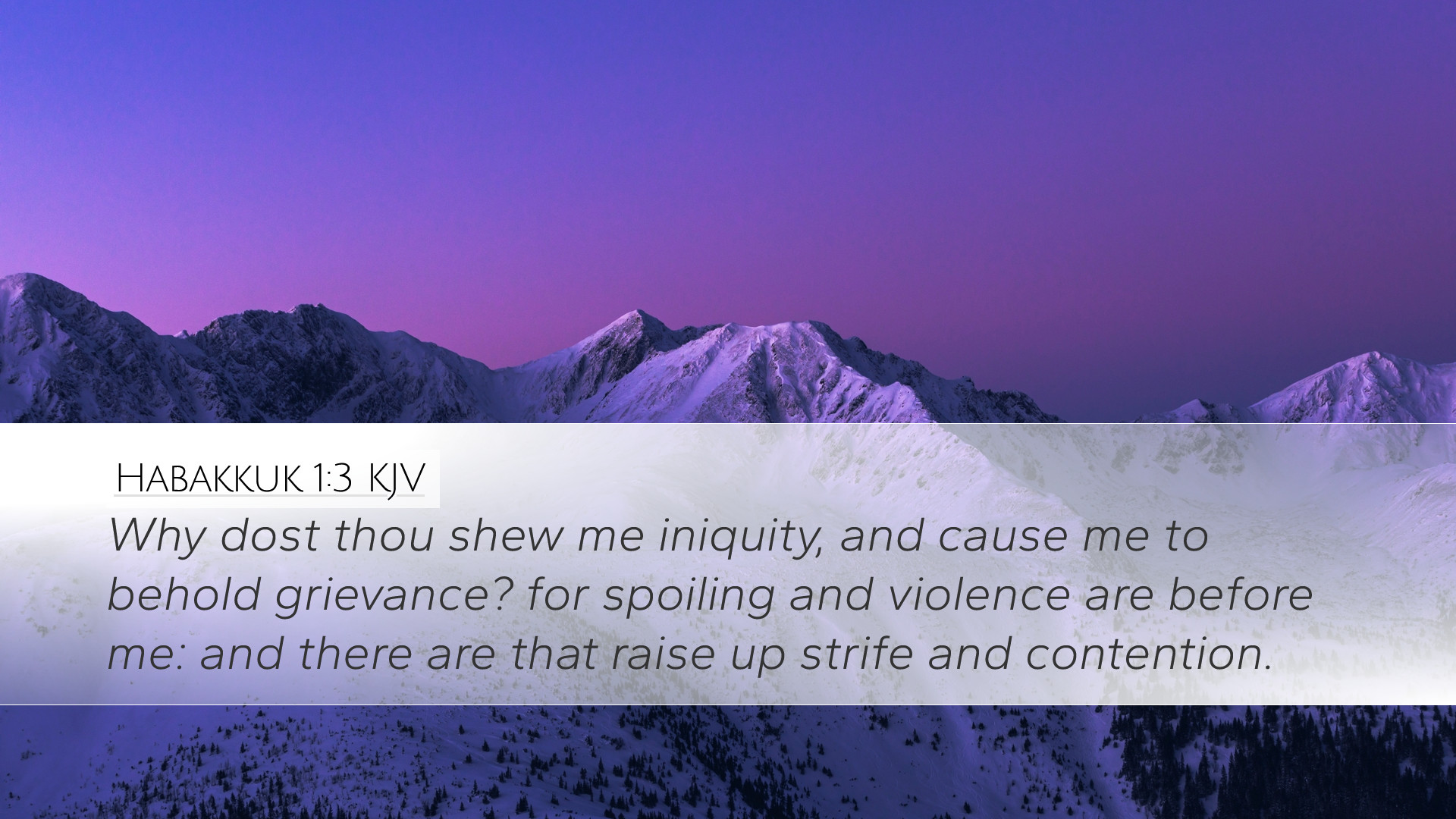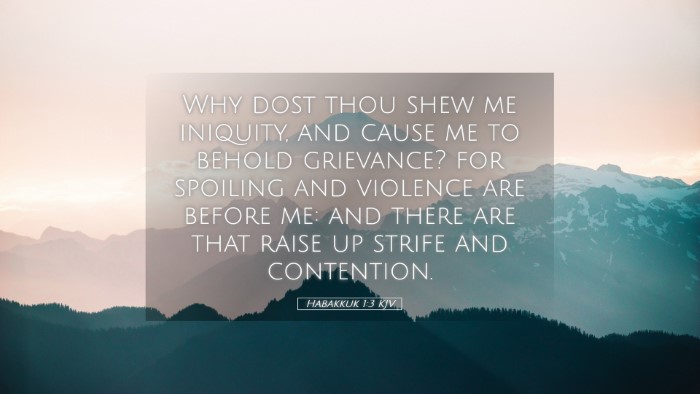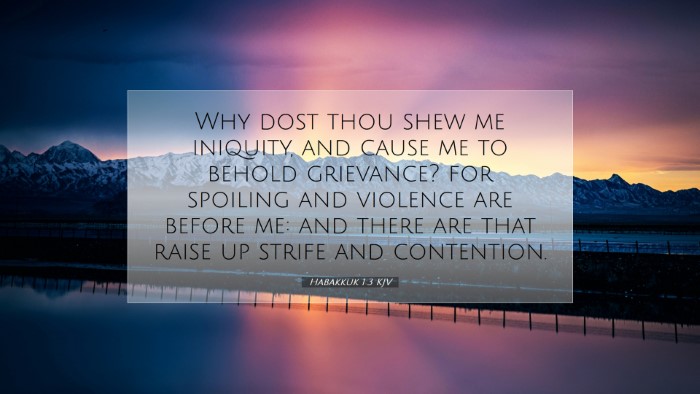Old Testament
Genesis Exodus Leviticus Numbers Deuteronomy Joshua Judges Ruth 1 Samuel 2 Samuel 1 Kings 2 Kings 1 Chronicles 2 Chronicles Ezra Nehemiah Esther Job Psalms Proverbs Ecclesiastes Song of Solomon Isaiah Jeremiah Lamentations Ezekiel Daniel Hosea Joel Amos Obadiah Jonah Micah Nahum Habakkuk Zephaniah Haggai Zechariah MalachiHabakkuk 1:3
Habakkuk 1:3 KJV
Why dost thou shew me iniquity, and cause me to behold grievance? for spoiling and violence are before me: and there are that raise up strife and contention.
Habakkuk 1:3 Bible Commentary
Commentary on Habakkuk 1:3
Verse: "Why do You make me see iniquity, and why do You idly look at wrong? Destruction and violence are before me; strife and contention arise." (Habakkuk 1:3 ESV)
Introduction
The book of Habakkuk presents a profound inquiry into the nature of God's justice in the midst of pervasive evil. The prophet Habakkuk boldly engages God with heartfelt questions regarding the circumstances faced by the people of Judah. In chapter 1, especially verse 3, we see a deep struggle with the apparent indifference of God toward the rampant injustice and violence surrounding him.
Insights from Public Domain Commentaries
Combining insights from Matthew Henry, Albert Barnes, and Adam Clarke, we gain a comprehensive understanding of this verse's implications for both the prophet and the contemporary believer.
Matthew Henry's Commentary
Henry notes that Habakkuk's lament is rooted in the reality of his experience; he observes not only the sinfulness but also the consequences of sin evident in society. His double questioning—"Why do You make me see iniquity?" and "Why do You idly look?"—reveals a struggle with divine silence amidst turmoil.
- The Perception of Injustice: Henry emphasizes that Habakkuk is disturbed not merely by the presence of sin, but by God's seeming inaction. His grief is palpable as he witnesses destruction and violence.
- The Role of the Prophet: As a prophet, Habakkuk serves as an intermediary between God and the people, and his concerns reflect a sacred duty to call attention to moral decay.
- Afflicted with Strife: The mention of strife and contention suggests a community in chaos, which necessitates divine intervention.
Albert Barnes' Notes
Barnes provides additional historical context that enriches the understanding of this verse. He posits that Habakkuk speaks with a sense of urgency, indicating that the moral decay of Judah has reached critical levels.
- God's Holiness and Human Iniquity: Barnes elucidates that the prophet's question implies a trust in God's holiness. The perplexity arises because Habakkuk knows that God cannot condone sin.
- The Jarring Contrast: The vivid descriptions of violence and contention highlight a stark contrast to the expectations of God's chosen people, underscoring the discord between their calling and their conduct.
- Heartfelt Prayer: Barnes encourages readers to see this lament as a prayer—raw and real, demonstrating a desire for divine response and guidance.
Adam Clarke's Commentary
Clarke interprets Habakkuk's lamentation with a pastoral heart, emphasizing the emotional weight carried by the prophet. He argues that this expression of distress serves as a model for modern believers facing societal turmoil.
- Understanding God’s Inactivity: Clarke highlights that the prophet references God's “looking” at sin, suggesting a misunderstanding of divine patience and timing.
- Call to Reflection: Clarke encourages reflection; rather than viewing God’s delay as neglect, it should be seen as an invitation to deeper faith and introspection.
- The Nature of Evil: He suggests that recognizing evil is foundational to appreciating God's grace and righteousness when He acts to redeem.
Theological Implications
The theological discourse surrounding Habakkuk 1:3 invites reflection on several key themes:
- The Problem of Evil: Habakkuk’s questioning reflects a timeless struggle with the existence of evil and suffering. It addresses the question of how a good God can allow injustice.
- The Nature of Prophetic Intercession: This verse exemplifies the role of a prophet not just as a forecaster of future events but as a passionate advocate for justice.
- Patient Expectation: The subsequent verses indicate that while God's response may be delayed, it is ultimately assured, encouraging believers to cultivate patient faith.
Conclusion
Habakkuk 1:3 stands as a powerful testament to the human experience of grappling with faith in the midst of adversity. By integrating insights from esteemed commentators, we uncover the depth of the prophet’s struggle and the rich theological implications that resonate within this lament. For pastors, students, theologians, and scholars, this verse serves as a reminder of the ongoing dialogue between humanity and God amid the realities of moral failings and the hope of divine intervention.


